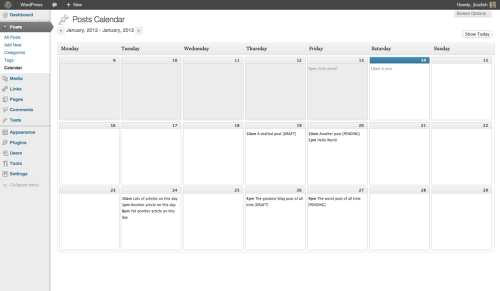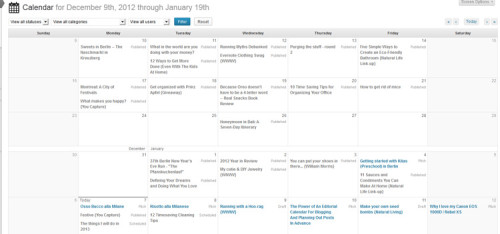Hearing the words “editorial calendar” come out of someone’s mouth can make it seem like it is a complicated thing. A lot of bloggers dismiss the idea of an editorial calendar simply because they think it’s too hard to make use of or too complicated and will only delay work. In reality, it does the actual opposite of the things that people perceive about it. An editorial calendar is a simple tool that can make your blogging a success as long as things are done accordingly. It may sound complicated but that’s just that. It only refers to a schedule of the things that you, as a blogger, are going to blog about and when. Just like your ordinary planner, it can cover several weeks, months or even up to a year. The purpose of this whole thing is to allow bloggers to plan ahead the contents of their blog and how they are going to go about posting them.
Editorial calendars can contribute greatly to the success of your blog, which is want you surely want to happen, especially if you are bad about writing posts on a daily basis. For me, one of my new goals is to write only once or twice a week at NOH, get a week or more worth of posts lined up, and only make slight adjustments as needed according to things that pop up along the way. It gives you real peace of mind to not be constantly on the hook to write, write, write. And since my brain doesn’t necessarily do so well when it has to jump back and forth all the time, this is a method I’ve been wanting to try for a long time.
What are the benefits of an editorial calendar?
- No more writer’s block and last minute scrambling of ideas – Articles that result from hasty writing don’t always come out as what you’d hope for. Rushed articles are most often subpar with errors and questionable information and organization. Also, without planning for your articles, you may end up writing about topics that do not appeal very well to your audience. With advance planning, you are afforded the time to carefully think about what should go into your blog and a properly researched write-up. You can also start ideas one day and right a rough draft or outline, then go back later on to finish up the post.
- Easy to get a quick visual overview – One thing I find really great about these editorial calendars is that you can see what is coming up, when you have holes in your content and what you need to be working on quickly. There’s no sorting through the pages of Posts and trying to map them out in your head.
- Approved by advertisers – If your blog is funded by advertisements, the advertisers appreciate it if they know in advance what other content they will be running up against. Example, a beauty salon wouldn’t want to be advertised next to an article that talks of the dangers of hair coloring.
- Stay organized – With an editorial calendar, you can organize different topics; you are able to arrange your posts, spreading them out evenly and reasonably. When you have multiple blog contributors, you definitely benefit from the calendar. It is where everybody can refer to so that the posts are not mixed and jumbled up. Contents also don’t get repeated, unnecessarily wasting the efforts of other contributors who’ve written about the same topic. You can look both forwards and backwards to see what you’ve written about lately.
- Advance blogging – You do not want the time to come when you sit in front of the computer and realize you haven’t prepared your content and you do not have time right at that moment to start writing for one. When you prepare blogs in advance, you keep the content flowing even when other things can get in the way.
- Aligning blog posts with events – If you have events to attend to, you can mark your calendars so that it can coincides with the posts you are putting up on that same day. Or for holidays.
- Sticking to the schedule – Like all calendars, the editorial one allows you to keep track of the times and days. It helps you to stick to the schedule weekly, monthly or yearly.
What editorial calendar should I use?
There are several options out there, which range from just using paper calendars to Google Calendar to some other program, but I personally like to use the editorial calendar plugins for WordPress which make life so much easier, especially when you need to start shifting things around! They really are quite similar in functionality and I think most people will be able to use Editorial Calendar without any trouble and love it. But if you’re looking for something more advanced or need more features, Edit Flow is a great option as well.
- Editorial Calendar — Probably the most well known of the editorial calendar plugins, this one has been around for quite a long time and I absolutely loved used it…until it started having trouble with some of the other plugins I had installed. It’s easy to get started with and simple to drag-and-drop posts to reschedule the day they should be published. The interface is really easy to understand and everything is quite straght forward. And you can see the overview of your posts and add post/drafts on specific days just by clicking on that day in the calendar.

- Edit Flow — This plugin is a bit more hardcore and actually intended for multi-blogger blogs…but it works just fine for a single blogger (like myself) as well. The monthly visual overview (up to 6 weeks at a time) is great and you can drag-and-drop posts in this plugin as well. If you need to input story budgets or are working on your blog with another writer or editor, you can leave notes in the post which are specifically for that purpose, as well as a few other features which I have absolutely no use for. But it works with on my blog after Editorial Calendar had conflicts, so I’m happy with it.

Do you use an editorial calendar to keep things moving forward with your blog? If so, what kind do you use and what are your tips?


